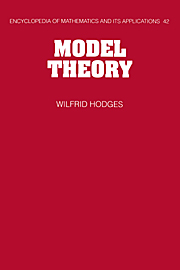Book contents
- Frontmatter
- Contents
- Introduction
- Note on notation
- 1 Naming of parts
- 2 Classifying structures
- 3 Structures that look alike
- 4 Automorphisms
- 5 Interpretations
- 6 The first-order case: compactness
- 7 The countable case
- 8 The existential case
- 9 The Horn case: products
- 10 Saturation
- 11 Combinatorics
- 12 Expansions and categoricity
- Appendix: Examples
- References
- Index to symbols
- Index
8 - The existential case
Published online by Cambridge University Press: 08 October 2009
- Frontmatter
- Contents
- Introduction
- Note on notation
- 1 Naming of parts
- 2 Classifying structures
- 3 Structures that look alike
- 4 Automorphisms
- 5 Interpretations
- 6 The first-order case: compactness
- 7 The countable case
- 8 The existential case
- 9 The Horn case: products
- 10 Saturation
- 11 Combinatorics
- 12 Expansions and categoricity
- Appendix: Examples
- References
- Index to symbols
- Index
Summary
J'ay trouvé quelques élémens d'une nouvelle caracteristique, tout à fait différent de l'Algebre, et qui aura des grands avantages pour representer à l'esprit exactement et au naturel, quoyque sans figures, tout ce qui depend de l'imagination. … L'utilité principale consiste dans les consequences et raisonnements, qui se peuvent fair par les operations des caracteres, qui ne sçauroient exprimer par des figures (et encor mois par des modelles).… Cette caracteristique servira beaucoup à trouver de belles constructions, parceque le calcul et la construction s'y trouvent tout à la fois.
Leibniz, Letters to Huygens (1679).Abraham Robinson referred to these letters of Leibniz in his address to the International Congress of Mathematicians in 1950. It seemed to Robinson that Leibniz hinted at Robinson's own ambition: to make logic useful for ‘actual mathematics, more particularly for the development of algebra and … algebraic geometry’.
Robinson introduced many of the fundamental notions of model theory. Besides diagrams (section 1.4), preservation of formulas (section 2.5) and nonstandard methods (section 11.4), he gave us model-completeness, model companions and model-theoretic forcing (all in this chapter). These three notions have a flavour in common. Each of them allows us to develop a tidy piece of pure model theory for its own sake, and at the same time each of them fits neatly onto some piece of ‘actual mathematics’. Often they allow us to give tidier and more conceptual proofs of known mathematical theorems.
Information
- Type
- Chapter
- Information
- Model Theory , pp. 360 - 411Publisher: Cambridge University PressPrint publication year: 1993
